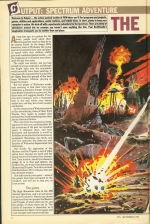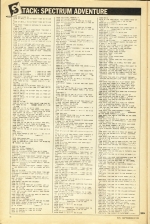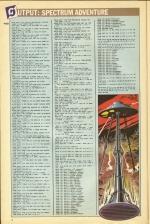
Personal Computer News
 22nd September 1984
22nd September 1984
Author: Paul Braithwaite
Published in Personal Computer News #079
THE HIGH MOUNTAINS
Welcome to Output - the action-packed section of PCN where you'll find programs and projects, games, utilities and applications, useful routines, and helpful ideas. In short, plenty to keep your computer in action. We kick off with a spectacular adventure for the Spectrum. There are plenty of adventures around but we promise you haven't seen anything like this. Paul Braithwaite's imagination transports you to another time and place.
A long time ago, in a galaxy far, far away, people went about their business pretty much as they do on the planet Earth. In the slepy little dormitory town of Wichester the young executives polished their cars and played squash while their children sniffed glue and vandalised phone booths - all the trappings of civilization were there, until the day *they* came.
The night was stormy, but not bad enough to arouse suspicions, and though the bright light over the mountains would normally have been puzzling, it was generally assumed this was just the arc lights from the ground of the local team, Wichester Athletic, playing at home that night.
But the people of Wicester awoke next morning to find their town had undergone a dramatic change. Initially some people blamed it on a power cut, but there were still nagging doubts. Power cuts don't normally leave a blackened hole in the wall where your shaver socket was, and they don't melt toasters and kettles.
As the commuters of Wichester stared at the smouldering ruins of their Ford Fiestas, they began to suspect that perhaps they faced something more than just an electrical failure.
The voice from the mountains, booming out over the town, confirmed this. All the inventions of the past two hundred years, it informed them, had been destroyed, and henceforth it would be forbidden to use electrical or mechanical equipment. Resistance was futile, and over the centuries the clean-cut unit families of Wichester degenerated into barbarism.
But finally the oppression of the Masters and the Tripods, a sort of robot police force, became too much and the people resolved to destroy their tormentors. Your mission, should you choose to accept it, is to find and destroy the Golden City, the home of the dominating Masters and Tripods. To do this you must find the balloon, fill it with gas, then use the ultimate weapon.
But take care on your quest - some of the people have been corrupted by the invaders, and will try to stop you, so trust no-one.
The Game
The High Mountains runs on the 48K Sinclair Spectrum, and is an adventure for up to five players. Players can choose characters from two groups: the Masters and Tripods, of whom there are 16, and the people, of whom there are 14. The choice of character is important, as it determines the object of your quest, and your strength and manoeuvrability.
The quests are:
- The Masters and Tripods must attempt to destroy all the people not controlled by players.
- The people must compete in a quest to destroy the Golden City.
The program listings should be typed into the computer in the following sequence. First, Listing 1 should be typed in, and then run. This listing pokes the new character set into memory, then displays it on screen. If any of the characters look malformed the probably line in which the mistake was made can be determined by entering the defective letter. If the characters are completely wrong you must check all the data. Once the character set is satisfactory, enter OK and the program saves and verifies the data. You can then clear the program from memory and type in Listing 2.
Next, run the program and follow the on-screen instructions. These will ask for the data saved from Listing 1 to be laoded, and will then save the whole program, new characters as well.
Should you find you've mistyped a line in Listing 2 alter that line, and type GOTO 20.
Any readers who want a cassette should send a postal order for £2 to Paul Braithwaite, 15 De-Verdun Ave, Belton, Loughborough, Leics.
Arrays
| a$() | The character's names |
| b$() | The object names |
| a() | The character's positions |
| c() | The character's strength |
| d() | The character's manoeuvrability |
| f() | The object's position |
| g() | The object's strength |
| i() | Object 1 the characters can carry |
| j() | Object 2 the characters can carry |
| p() | The player's character's numbers |
| d$() | Break down of the latest command |
Letters
| no | Number of players |
| z | Number of the character of the current player |
| q | Player number of the current player |
| r | Number of turns the current player has had |
| v$ | Location description |
| v,w,x,y | Variables determining the directions the characters can move |
| c$ | Command |
| pos,begin | Used to break down the command into separate words |
| Table 1. The Main Variables | |
Line Notes
| 10 | The instructions |
| 140 | Choosing the characters |
| 271 | The Main program loop, consisting of: |
| 290-379 | Prints where you are, the directions in which you can move and what you can see |
| 380-389 | Decides whether someone is attacking you |
| 390-400 | Your commands are entered |
| 410-455 | The commands are interpreted |
| 460-606 | The program jumps to the appropriate subroutine for the command |
| 610-620 | Routine explaining that your command was not understood |
| 650-662 | Decides whether a 'baddie' has won the game |
| 670-680 | Moves the objects the current player is carrying |
| 1200 | Climb in routine |
| 1800 | Ride in routine |
| 2400 | Fight/kill routine |
| 3200 | Examine routine |
| 3500 | Look routine |
| 3800 | Inventory routine |
| 4100 | Get/Take routine |
| 4700 | Swim routine |
| 5000 | Fill routine |
| 5600 | Move north routine |
| 5700 | Move south routine |
| 5800 | Move east routine |
| 5900 | Move west routine |
| 6600 | Unlock routine |
| 6800 | Save game routine |
| 6800 | Load game routine |
| 7500 | Data for locations (104 of them) |
| 8700 | Random attack routine |
| 8800 | Win routine for 'goodies' |
| 8900 | Random movement of characters |
| 9000 | Variable initiation routine |
| Table 2. Program Breakdown | |
This article was converted to a web page from the following pages of Personal Computer News #079.






